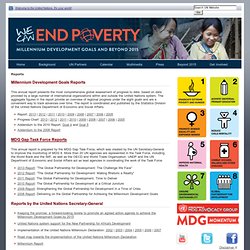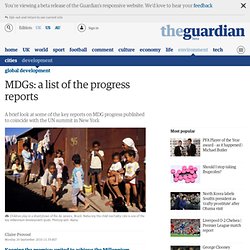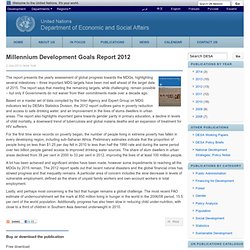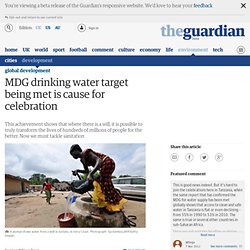

How Irish NGOs are contributing to the Millennium Development Goals. News from the 2013 MDG summit. News from the 2013 MDG summit 25/09/2013 at 6:44 am At the end of September, the UN’s General Assembly held a number of events to take stock of progress towards in global development.

Here’s the official outcome document, and some reports on what happened at, and around, the summit: Ireland at the UN General Assembly NGO comments: Video blogs from Trócaire’s Justin Kilcullen (Video: Day 1) (Video: Day 2) (Video: Outcomes of Day 2) Outcomes Day 2 Dóchas in the Metro Herald (25 Sept) Dóchas in The Journal (24 Sept): “The Millennium Development Goals are a partnership, a contract. The politics of getting women elected (Irish Examiner, 23 Sept) “When the voices of women are under-represented in decision-making, issues that exclusively or primarily affect women will inevitably be relegated to secondary importance. Www.dochas.ie/Shared/Files/4/Poverty_is_not_history_but_goals_brought_focus. Development Progress. Hans Rosling: The good news of the decade?
MDGs progress reports. Disclaimer The United Nations is not responsible for the content of any messages posted on this site or sites linked from this page.

The inclusion of a message does not imply the endorsement of the message by the United Nations. Millennium Development Goals Reports This annual report presents the most comprehensive global assessment of progress to date, based on data provided by a large number of international organizations within and outside the United Nations system. MDGs: a list of the progress reports. Keeping the promise: united to achieve the Millennium Development Goals (or, the "outcome document" of the MDG summit) A 32-page resolution, the official "outcome document" of the MDG summit was adopted by consensus at the general assembly on Wednesday 22 September, and includes an "action agenda" to speed up progress on the MDGs.

The outcome document has already been heavily criticised by civil society organizations; Bond has collected some of these critiques here. The global health strategy for women's and children's health Aimed at the world's 49 poorest countries, this paper was introduced by the UN secretary general Ban Ki-moon on the last day of the summit. The strategy is designed to prevent the deaths of over 15 million children (including three million newborns), and also takes aim at maternal mortality.
Who's really fighting hunger? Millennium Development Goals Report 2012 - United Nations Department of Economic and Social Affairs. The report presents the yearly assessment of global progress towards the MDGs, highlighting several milestones – three important MDG targets have been met well ahead of the target date of 2015.

The report says that meeting the remaining targets, while challenging, remain possible – but only if Governments do not waiver from their commitments made over a decade ago. Based on a master set of data compiled by the Inter-Agency and Expert Group on MDG indicators led by DESA’s Statistics Division, the 2012 report outlines gains in poverty reduction and access to safe drinking water, and an improvement in the lives of slums dwellers in urban areas. The report also highlights important gains towards gender parity in primary education, a decline in levels of child mortality, a downward trend of tuberculosis and global malaria deaths and an expansion of treatment for HIV sufferers.
Lastly, and perhaps most concerning is the fact that hunger remains a global challenge. MDG progress chart. MDG drinking water target being met is cause for celebration. More than 3,000 children die daily from diarrhoeal diseases, and 88% of these deaths are due to poor drinking water, lack of sanitation and poor hygiene.

So the news from the World Health Organisation and Unicef joint monitoring programme that the world has met the drinking water target of the millennium development goals is very welcome. Since 1990 over 2 billion more people in the world have received access to drinking water. And this progress has not been driven by just big middle-income countries – smaller, less well-endowed countries have also shown the way. Even in sub-Saharan Africa, where progress towards achieving the target is off-track, 273 million additional people gained access to drinking water since 1990.
So, we should raise our hats to the governments, organisations, communities and individuals who put great effort and resources into making this happen. However 783 million people still do not have access to drinking water, this most basic human right.